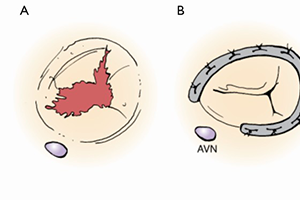Surgical outcomes of isolated tricuspid valve procedures: repair versus replacement
Abstract
Background: Isolated tricuspid valve (ITV) operations are infrequent and the decision to operate is controversial. We report a series of ITV operations to outline the current disease status requiring this uncommon procedure with an emphasis on the results of tricuspid valve repair (TVr) versus replacement (TVR).
Methods: Using our prospective cardiac surgery database, 57 patients who underwent ITV operations between 01/02–03/14 were identified. Median follow up time was 3.5 years [interquartile range (IQR), 0.8–6.7 years].
Results: Fifty-seven patients underwent ITV surgery with a mean age of 54.4±14.9 yrs and 61% were women. Baseline characteristics were similar between patients who underwent TVr (n=18) or TVR (n=39). The etiologies of TV dysfunction were: ITV endocarditis 14/57 (25%), persistent TV regurgitation after left-sided valve surgery in 12/57 (21%), traumatic biopsies and iatrogenic injury from pacing leads in 11/57 (19%), orthotopic heart transplant 9/57 (16%), carcinoid syndrome 3/57 (5%), congenital 2/57 (5%) and idiopathic 5/57 (9%). Overall, 32/57 (56%) patients had prior heart surgery; of which 10/32 (31%) were TV procedures. Bioprosthetic prostheses were used in 34/39 (87%) patients. Of those who had repair, 11/18 (61%) had ring annuloplasty, 3/18 (17%) bicuspidization, and 3/18 (17%) De Vega annuloplasty and one had vegetectomy. Operative mortality was 5.1% (n=2) and 16.7% (n=3) for TVR and TVr groups, respectively (P=0.32), with an overall mortality rate of 8.6%. Postoperative complications included new onset renal failure in 6/39 (15%) of TVr and 2/18 (11%) of TVR (P=0.71) and there were no strokes. Overall survival rates and degree of residual RV dysfunction were similar for the two groups (both P=0.3). Five-year survival was 77% and 84% for TVr and TVR respectively (P=0.52). There was no difference in rates of recurrent tricuspid regurgitation for TVr and TVR (35.7% vs. 23.5%, respectively, P=0.4).
Conclusions: ITV surgery is associated with improved but still relatively high operative mortality. Mid-term outcomes for TVr and TVR are similar with regards to postoperative complications, survival, and freedom from recurrent tricuspid regurgitation.
Cover






